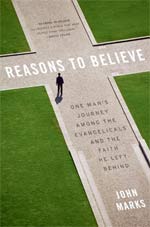 I met John Marks, author of Reasons to Believe during a screening of Purple State of Mind. Given that we're both transplanted Southerners, I was interested in exploring why he chose to leave the faith of his childhood. Following is a short interview of what I hope will be an ongoing conversation.
I met John Marks, author of Reasons to Believe during a screening of Purple State of Mind. Given that we're both transplanted Southerners, I was interested in exploring why he chose to leave the faith of his childhood. Following is a short interview of what I hope will be an ongoing conversation.
Briefly describe your childhood.
I grew up in a nominally Christian home. My folks were Presbyterians, and we went to church on Sundays and said prayer before meals. Religion wasn't a big deal in our home, except as a mostly unspoken tradition.
Why do you say that had you been pastored by Bob Russell, you might not have left the faith?
Pastors are surrogate fathers and mean a great deal to a lot of young Christians I've met. In my experience as a teenager, I never had a strong adult mentor who represented the faith in any mature way. Most of my "pastors" were Young Life leaders or youth group leaders who were decent people but didn't have much intellectual or theological wattage. The pastor of my parents' church was a distant figure who seemed to have little or no relation to my life.
How did your encounter with Craig Detweiler, your college roommate at Davidson College, inform your faith?
At first it gave my faith a new sense of community, because I could share it with a close friend who also loved movies and music, but the experience turned out to be off-putting when Craig's evolution in the faith couldn't make room for my development as an artist.
What happened when you were covering the Balkans for U.S. News & World Report that made you stop believing in God?
I met a Muslim refugee whose village had been destroyed. He told me that his last hope resided in his sons, who had been taken prisoner by Serbs and would be released at war's end. My interpreter whispered in my ear that his sons were dead. I knew this, and he didn't, but I couldn't be the one to tell him. The perversity of that moment shattered for good my capacity to believe in some sovereign order in the universe.
As a former reporter, what reflections do you have on the role of religion in the public square -- especially as we head into the 2008 election?
Faith is now a diffused force across the full political spectrum. Four years ago, it was a much more targeted and quantifiable factor, mostly on the side of the Republican Party. No one will have an easy time this year trying to decide which political choice is biblical.
What do you want for Christians to take away from this book? That there is a conversation to be had with non-Christians that doesn't involve rancor and mockery?
The conversation is necessary, but it doesn't have to be anodyne. No one has to compromise, but everyone has to listen and show a modicum of respect. It's simple and hugely difficult at the same time.
How was this book the genesis for the documentary Purple State of Mind?
When I sold it to HarperCollins, I immediately called Craig Detweiler, my sophomore college roommate, because he had known me best when I believed. I wanted to go back in time and rehash the past. He wanted to turn on the cameras.
Any thoughts on how we can continue the dialogue that Craig and you have begun?
The best bet is to be determined in spirit, modest in ambition, at least at first. Find the one or two people whose company you enjoy and yet with whom you disagree and start to listen. If they listen, too, then there is hope. Alcohol and caffeine can be immensely helpful in the right doses.
 Becky Garrison's books include The New Atheist Crusaders and Their Unholy Grail.
Becky Garrison's books include The New Atheist Crusaders and Their Unholy Grail.
Got something to say about what you're reading? We value your feedback!